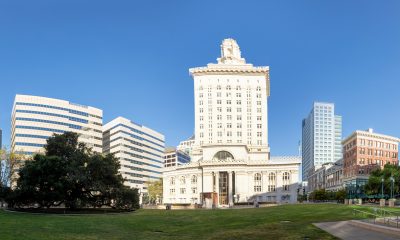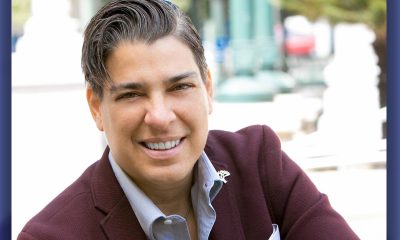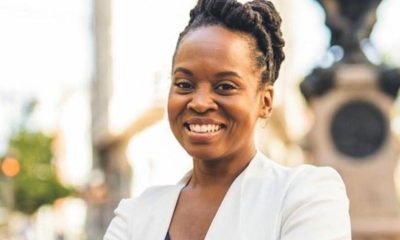Activism
City’s Homeless Efforts Are “Inefficient” and Often “Harm More Than Help,” Advocates Say

Community members and the Oakland City Council came together this week to look at the successes and failures of ongoing local attempts to grapple with the city’s rapidly growing homelessness emergency and to propose comprehensive solutions that so far have remained elusive.
At Wednesday evening’s special Life Enrichment Committee meeting, chaired by Councilmember Loren Taylor, city officials presented a report, “PATH Framework,” meant to serve as an approach for “addressing homelessness across the full spectrum of services form prevention and intervention to solutions/housing.”
Shredding the city’s current practices, members of the community, including The Village in Oakland and the East Oakland Collective, criticized the city for spending millions of dollars “on ineffective approaches that harm more than help curbside residents.”
Homeless advocates are demanding an immediate end of evictions of curbside communities, demolitions of homes and towing of vehicles people live in or store belongings in; (and) an immediate end to the destruction of curbside residents’ personal property and survival gear.
The advocates also are calling on the Mayor and Administration to implement a resolution passed by the City Council a year and a half ago, which said two parcels of public land in each district should be designated as spaces for curbside communities.
At present, the city maintains 692 beds and spaces. The homeless population in the city is variously estimated at 4,000, 7,000 and 14,000.
The city currently is spending $34 million to deal with homelessness, which includes city, county, state, federal and private funds. Forty-six percent of the money is one-time funding.
City officials estimate that fully implementing their approach would cost $123 million a year, plus $220 million in one-time capital costs.
Opening the meeting, Councilmember Taylor said, “Business as usual (clearly) has not been working…. (This) is an opportunity to address this crisis, to give it the attention it deserves.”
“We’re spending a lot of money on police removing people without knowing where the people go…There need to be allowed self -governing places,” said Council President Rebecca Kaplan.
“We’ve kind of have a lose-lose (situation),” she said, pointing out that the city pushes the homeless from place to place, but housed neighbors with complaints are not getting served either.
The city has over 4,000 vacant lots, some of which could be used as safe places for self-governing encampments, she said.Calling for more mental health services, Councilmember Noel Gallo said, ““We don’t have anything to the scale that we need,” he said.
One of the community speakers at the meeting was Dominique Walker, a member of Moms 4 Housing, which has been occupying a vacant home in Oakland since late November.
“There is no reason why people shouldn’t have houses in Oakland,” Walker said. “There are four vacant homes for everyone homeless person in this city.
“Our organization came out of a desperate need. I work two jobs, and we’re still homeless.” Walker said the city should manage a database of vacant properties, fix these properties and “house homeless moms and kids in them.”
“Gov. Newsom has declared this a state of emergency. You should acknowledge that and treat it as such,” instead of proposing “solutions that aren’t solutions,” she said.
Activism
Oakland Post: Week of December 25 – 31, 2024
The printed Weekly Edition of the Oakland Post: Week of December 25 – 31, 2024

To enlarge your view of this issue, use the slider, magnifying glass icon or full page icon in the lower right corner of the browser window. ![]()
Activism
Living His Legacy: The Late Oscar Wright’s “Village” Vows to Inherit Activist’s Commitment to Education
Kingmakers of Oakland (KOO), a nonprofit organization that works to improve educational and life outcomes for Black boys and men, stated that “Oscar Wright is one of the most prolific, consistent, and committed advocates of equity for Black students and Black Families here in Oakland for the past six decades.”
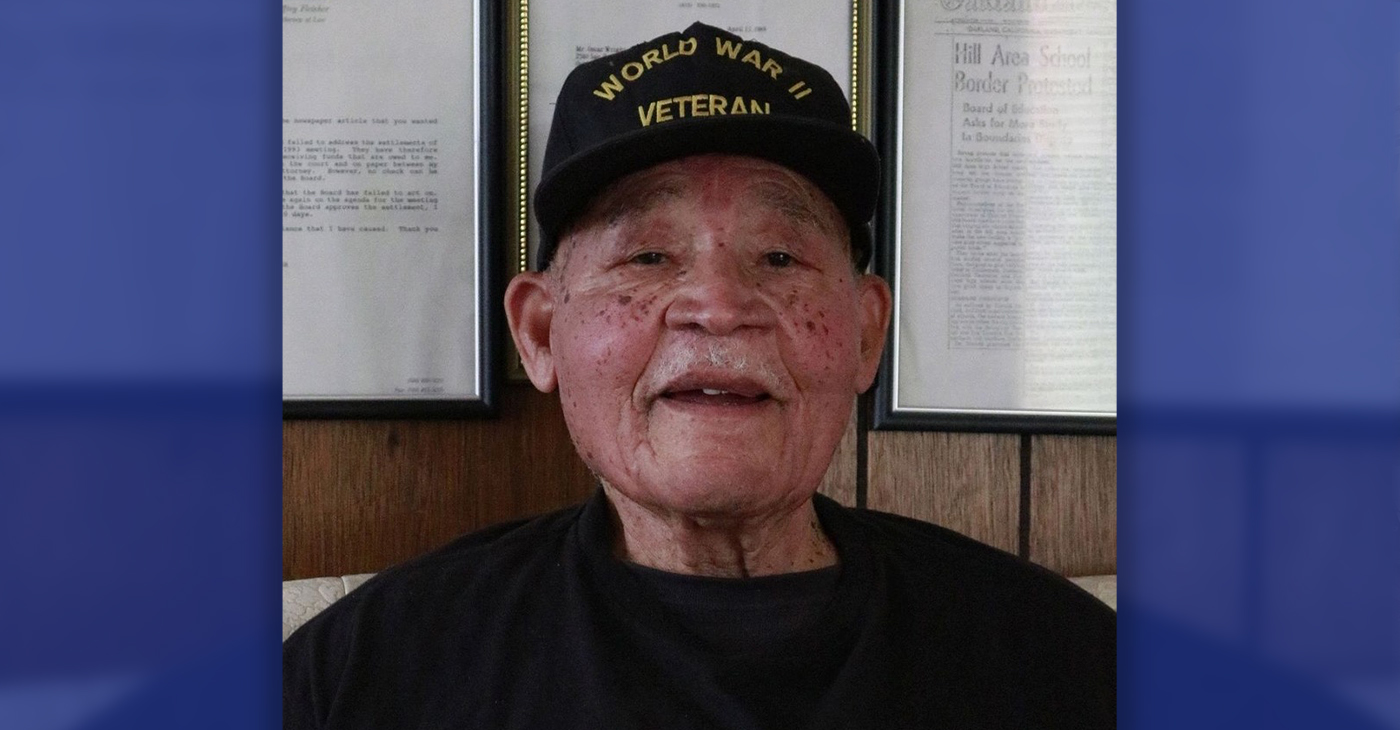
By Antonio Ray Harvey, California Black Media
Activists mourning Oscar Carl Wright’s death, have pledged to continue his lifelong mission of advocating for Black students and families in Northern California.
Wright, 101, who passed away on Nov. 18, was involved in Oakland’s educational affairs until his death.
Now, friends and admirers acknowledge that carrying on his legacy means doubling down on the unfinished work that Wright dedicated his life, time, and resources to, according to Y’Anad Burrell, a family friend and founder of San Francisco-based Glass House Communications (GHC).
“Mr. Wright did a lot of work around equity, specifically, for Black students based on their needs — whether it was tutoring, passing classes, or graduating,” Burrell said.
Wright became a champion for his children’s education, recognizing the disparities between their school experiences and his own upbringing in the Mississippi Delta.
Burrell told California Black Media (CBM) that the crisis of unequal access to resources and a quality education continues to affect the Oakland Unified School District (OUSD).
According to Oakland Reach, in the city of Oakland, only 3 in 10 Black and Brown students are reading at or above grade level. In addition, only 1 in 10 are doing math at or above grade level.
Oakland REACH is a parent-run, parent-led organization. It aims to empowers families from the most underserved communities to demand high-quality schools for their children.
Wright’s work as an activist had impact across the state but he was primarily known in the Bay Area. Alongside the Black United Front for Educational Reform (BUFER), he filed a complaint against OUSD for violating the Civil Rights Act of 1964.
In 2000, the OUSD school board proposed an action plan to address educational inequity, but it was never implemented.
Wright later founded the African American Honor Roll Celebration at Acts Full Gospel Church, an award that recognizes Black students with a grade point average of 3.0 or better. Each year, more than 1,000 students are honored at this ceremony.
Kingmakers of Oakland (KOO), a nonprofit organization that works to improve educational and life outcomes for Black boys and men, stated that “Oscar Wright is one of the most prolific, consistent, and committed advocates of equity for Black students and Black Families here in Oakland for the past six decades.”
Burrell said that one of the main reasons Wright’s work was so essential for families and children in Oakland that is the direct relationship between acquiring a quality education and affording quality housing, maintaining food security, achieving mental wellness, and securing stable employment.
Wright was the child of sharecroppers from Coahoma County, Mississippi. He attended Alcorn State University, a Historically Black College and University (HBCU).
In the late 1950s, Wright and his family relocated to the Bay Area where he worked as a contractor and civil engineer. He later became an active member of the National Association for the Advancement of Colored People (NAACP).
Burrell said the people who will carry on Wright’s work are part of a “village” that includes KOO’s CEO Chris Chatmon. Wright was a mentor to Chatmon.
“It will not be one entity, one person, or one organization that picks up the baton because it was a village effort that worked alongside Mr. Wright for all these years,” Burrell said.
Burell says that legacy will live on.
Activism
Protesters Gather in Oakland, Other City Halls, to Halt Encampment Sweeps
The coordinated protests on Tuesday in San Francisco, Oakland, Vallejo, Fresno, Los Angeles and Seattle, were hosted by Poor Magazine and Wood Street Commons, calling on cities to halt the sweeps and focus instead on building more housing.
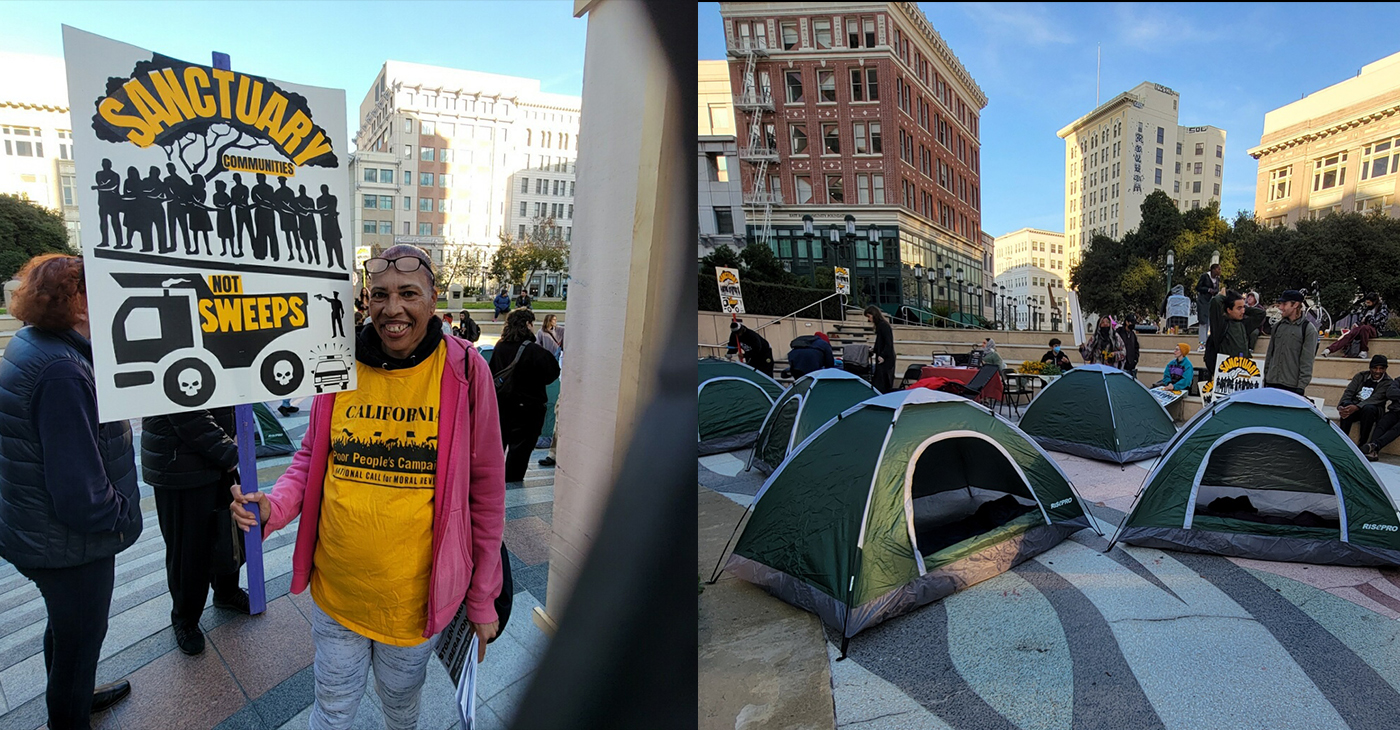
By Post Staff
Houseless rights advocates gathered in Oakland, San Francisco, Los Angeles, and other city halls across California and Washington state this week protesting increased sweeps that followed a U.S. Supreme Court decision over the summer.
The coordinated protests on Tuesday in San Francisco, Oakland, Vallejo, Fresno, Los Angeles and Seattle, were hosted by Poor Magazine and Wood Street Commons, calling on cities to halt the sweeps and focus instead on building more housing.
“What we’re dealing with right now is a way to criminalize people who are dealing with poverty, who are not able to afford rent,” said rights advocate Junebug Kealoh, outside San Francisco City Hall.
“When someone is constantly swept, they are just shuffled and things get taken — it’s hard to stay on top of anything,” said Kealoh.
Local houseless advocates include Victoria King, who is a member of the coordinating committee of the California Poor People’s Campaign. She and Dr. Monica Cross co-chair the Laney Poor People’s Campaign.
The demonstrations came after a June Supreme Court ruling expanded local governments’ authority to fine and jail people for sleeping outside, even if no shelter is available. Gov. Gavin Newsom in California followed up with an order directing state agencies to crack down on encampments and urging local governments to do the same.
Fresno, Berkeley and a host of other cities implemented new rules, making it easier for local governments to clear sidewalk camps. In other cities, such as San Francisco, officials more aggressively enforced anti-camping laws already on the books.
-

 Activism4 weeks ago
Activism4 weeks agoOakland Post: Week of November 27 – December 3, 2024
-

 Activism2 weeks ago
Activism2 weeks agoButler, Lee Celebrate Passage of Bill to Honor Congresswoman Shirley Chisholm with Congressional Gold Medal
-

 Activism2 weeks ago
Activism2 weeks agoPost News Group to Host Second Town Hall on Racism, Hate Crimes
-

 Activism2 weeks ago
Activism2 weeks agoDelta Sigma Theta Alumnae Chapters Host World AIDS Day Event
-

 Business2 weeks ago
Business2 weeks agoLandlords Are Using AI to Raise Rents — And California Cities Are Leading the Pushback
-

 Activism3 weeks ago
Activism3 weeks agoOakland Post: Week of December 4 – 10, 2024
-

 Activism2 weeks ago
Activism2 weeks agoOakland Post: Week of December 11 – 17, 2024
-

 Arts and Culture1 week ago
Arts and Culture1 week agoPromise Marks Performs Songs of Etta James in One-Woman Show, “A Sunday Kind of Love” at the Black Repertory Theater in Berkeley


